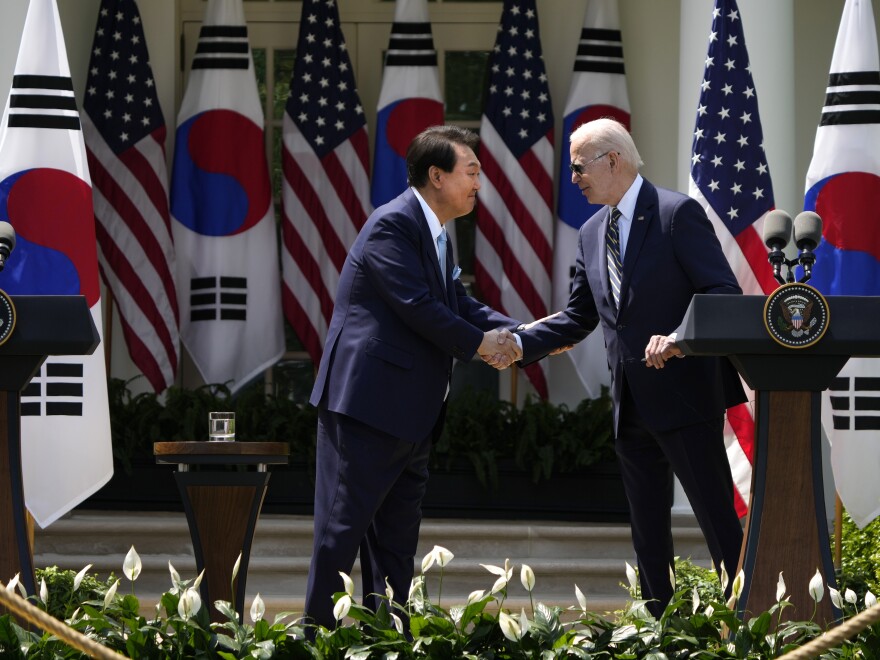Biden says that a nuclear attack from North Korea would mean 'the end' of its regime

By Anthony Kuhn,
Franco Ordoñez
Published April 26, 2023 at 6:09 AM EDT

Drew Angerer
/
Getty ImagesPresident Biden and South Korean President Yoon Suk Yeol shake hands during a press conference in the Rose Garden at the White House.
Updated April 26, 2023 at 4:29 PM ET
President Biden on Tuesday said that any kind of nuclear attack from North Korea against South Korea or other U.S. allies would be met with an overwhelming response.
His remarks came during a state visit by by South Korean President Yoon Suk Yeol where the two leaders agreed to formalize a series to steps to try to deter North Korea.
"Look, a nuclear attack by North Korea against the United States or its allies ... or partners is unacceptable and will result in the end of whatever regime to take such an action," Biden said during a press conference with Yoon.
Biden said the United States plans to deploy a U.S. ballistic missile submarine to the western Pacific for the first time since the 1980s, to be followed by other U.S. military hardware.
Its part of what the two leaders called the "Washington Declaration," which establishes a consultative group to regularly discuss how to deter North Korea from using its nuclear weapons and plan responses to any actions — a group like what the U.S. had with European allies during the Cold War.
South Korea has been requesting and the U.S. has been promising to give Seoul a bigger say in how to deter North Korea, including more joint planning, consultation and intelligence sharing.
At the White House, Yoon said peace on the Korean Peninsula does not happen automatically.
"Our two leaders have decided to significantly strengthen extended deterrence of our two countries against North Korea's nuclear and missile threats so that we can achieve peace through the superiority of overwhelming forces, and not a false peace based on the goodwill of the other side," he said, through an interpreter.
The U.S. is stepping up joint military drills with South Korea, and the deployment of U.S. aircraft carriers, strategic bombers and submarines. In bilateral talks last November, U.S. Defense Secretary Lloyd Austin pledged to make such deployments a routine occurrence.
Washington has made it clear it will not redeploy tactical nuclear weapons to South Korea, as hawks in both countries have called for. President Yoon suggested in January that South Korea might have to acquire its own nuclear weapons, but the U.S. opposes the idea, and Yoon quickly backpedaled from his assertion.
As the declaration emphasizes U.S. commitments to defend South Korea, Seoul will in return reaffirm its commitment to the nuclear non-proliferation treaty.
North Korea this month tested a new solid fuel intercontinental ballistic missile, the latest addition to its growing nuclear arsenal. It has also revamped its nuclear doctrine to include the possibility of preemptive strikes.
South Koreans have long been inured to the threat from the North, but a jittery South Korean public has prompted Seoul to ask the U.S. for tougher deterrence measures. The announcements appear to be aimed at calming those jitters, by repackaging previous commitments or adding new material to existing policies.
NPR's Se Eun Gong contributed to this report in Seoul.
Copyright 2023 NPR. To see more, visit https://www.npr.org.
No comments:
Post a Comment